Carney revives Liberal fortunes as party secures historic fourth consecutive election victory
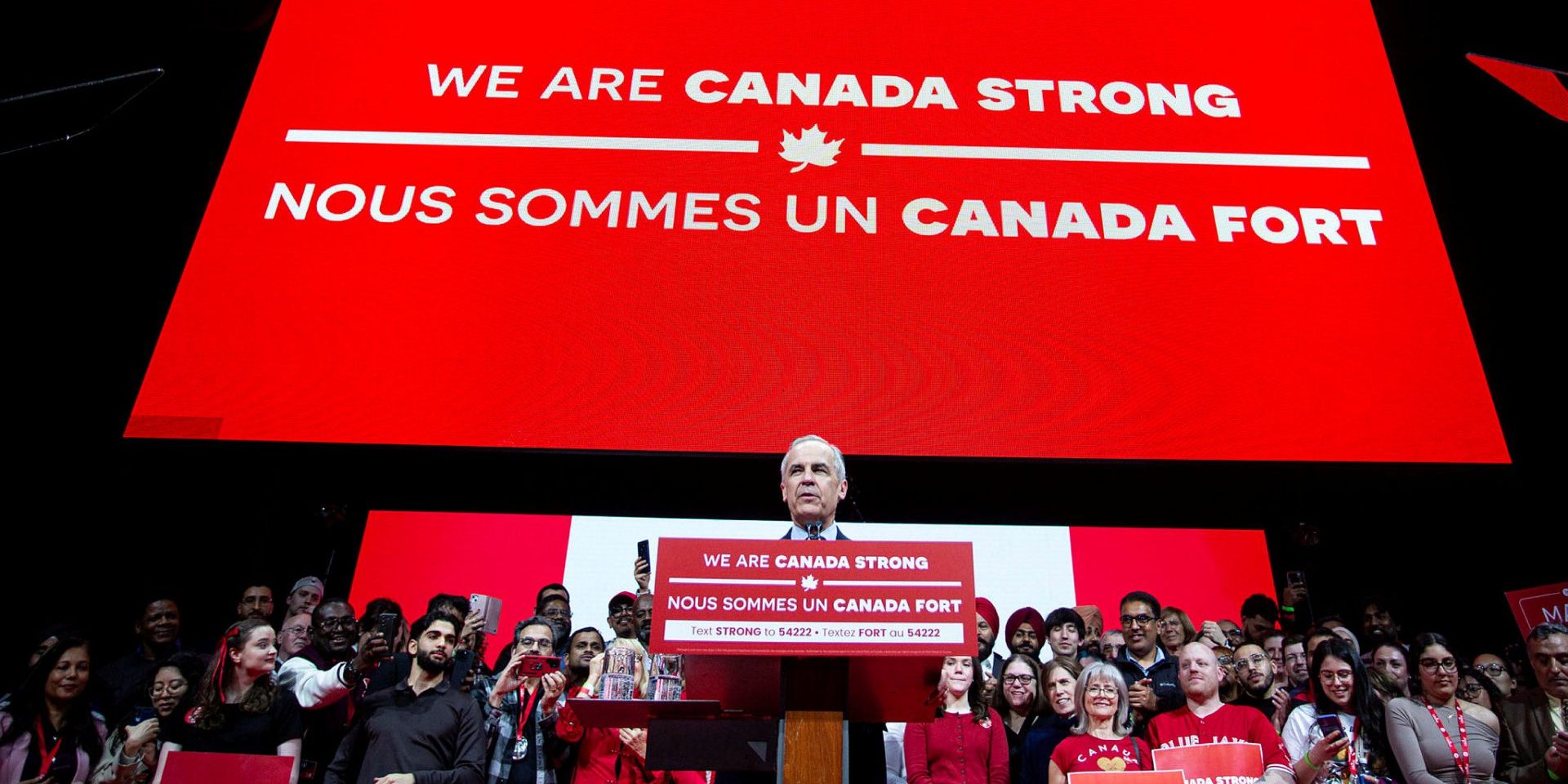
OTTAWA—Months after the Liberals’ time on the government benches seemed likely to end, Prime Minister Mark Carney has led his party to its fourth-straight election win.
Millions of Canadians cast their vote on April 28 in what many described as one of the most consequential elections in Canada’s history, amid an escalating trade war with the United States that has intensified over threats of annexation.
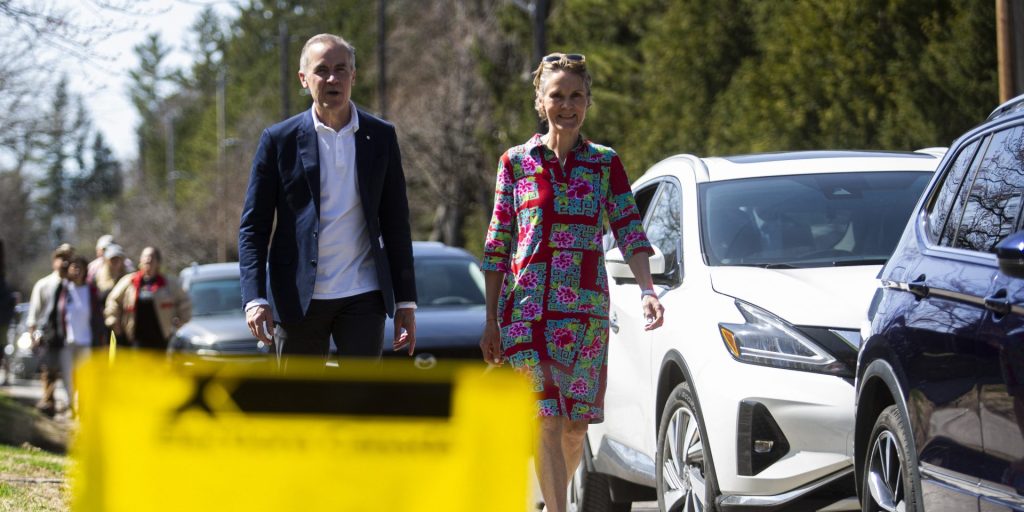
Just over an hour after voting ended across the country, CBC projected that the Liberals would retain their nearly decade-long hold on power, met with cheers from the crowd assembled at the TD Place Arena.
The six-week-long election campaign was dominated by the spectre of U.S. President Donald Trump and his imposition of punishing tariffs on Canadian imports, as well as a constant refrain of annexing Canada as a “51st state”
“I’ve been warning for months America wants our land, our resources, our water, our country,” Carney said in his victory speech. “These are not idle threats. President Trump is trying to break us, so America can own us.”
“That will never happen,” he added.
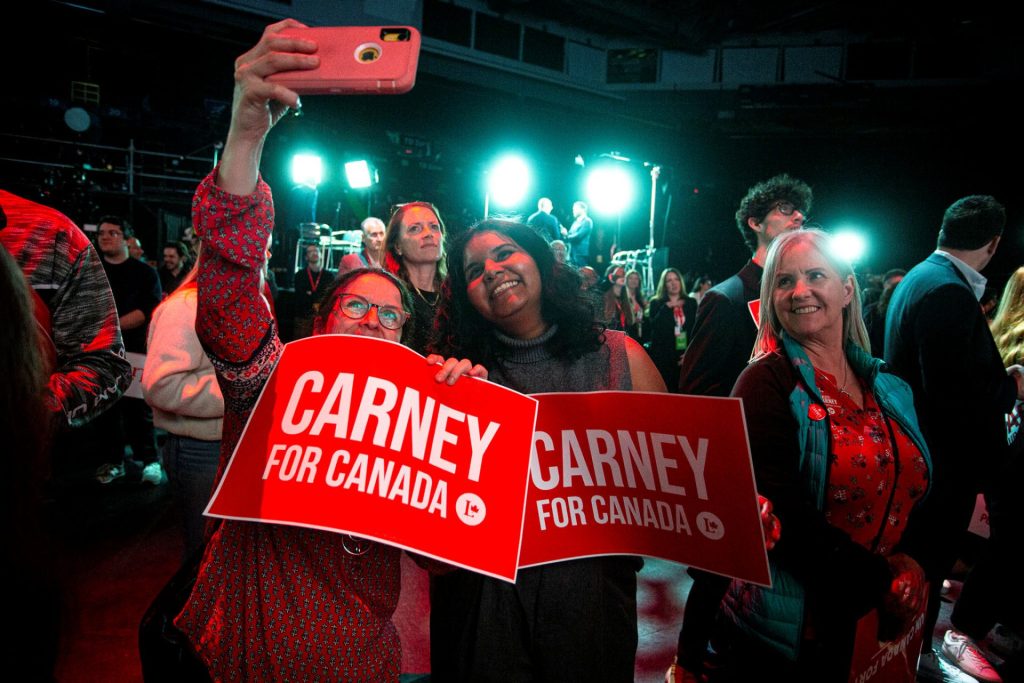
Carney delivered his speech in front of a large Canadian flag, his bright red lectern with the message: “We are Canada strong; Nous sommes un Canada fort.” Two additional Canada flags were also projected on either side of the stage, each accompanied by more “Canada strong” messaging.
Carney came to the stage as Carry On by Canadian singer-songwriter Cœur de pirate played. Other songs in Liberals’ repertoire included Sunglasses at Night, by Corey Hart, and The Tea Party’s Heaven Coming Down.
The Canadian prime minister highlighted the changing geopolitical order of which Canada has relied on since the end of the Second World War.
“We are over the shock of the American betrayal, but we should never forget the lessons,” he said. “We have to look out for ourselves and, above all, we have to take care of each other.”
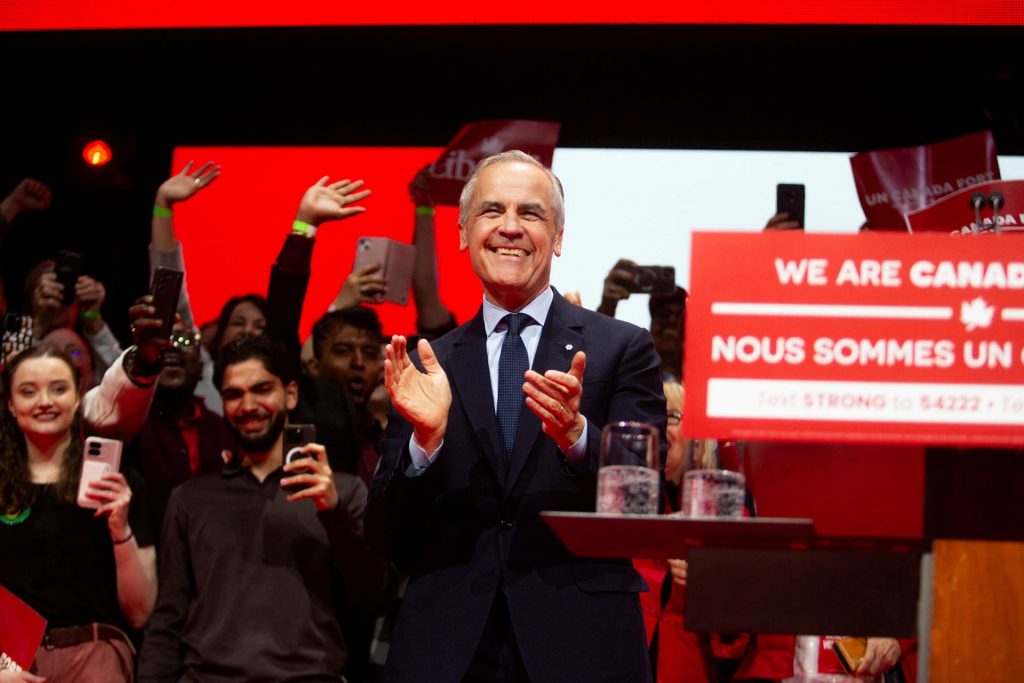
PMO chief of staff and past cabinet minister Marco Mendicino was in the crowd, as well as Public Safety Minister David McGuinty—who won re-election in Ottawa South, Ont.—and former justice minister David Lametti.
Sandstone Group managing partner Kevin Bosch, who was also at the TD Place, said there are two people responsible for the Liberals’ victory—Trump and Carney.
“Donald Trump just completely changed everything,” said Bosch, a former deputy director of the Liberal Research Bureau on the Hill.
“With Justin Trudeau still as the leader, we would be headed for a loss, quite frankly. But Donald Trump came along and threw all the pieces on the table and the Liberals selected the right guy to deal with the times,” he said. “Serious times call for a serious leader.”
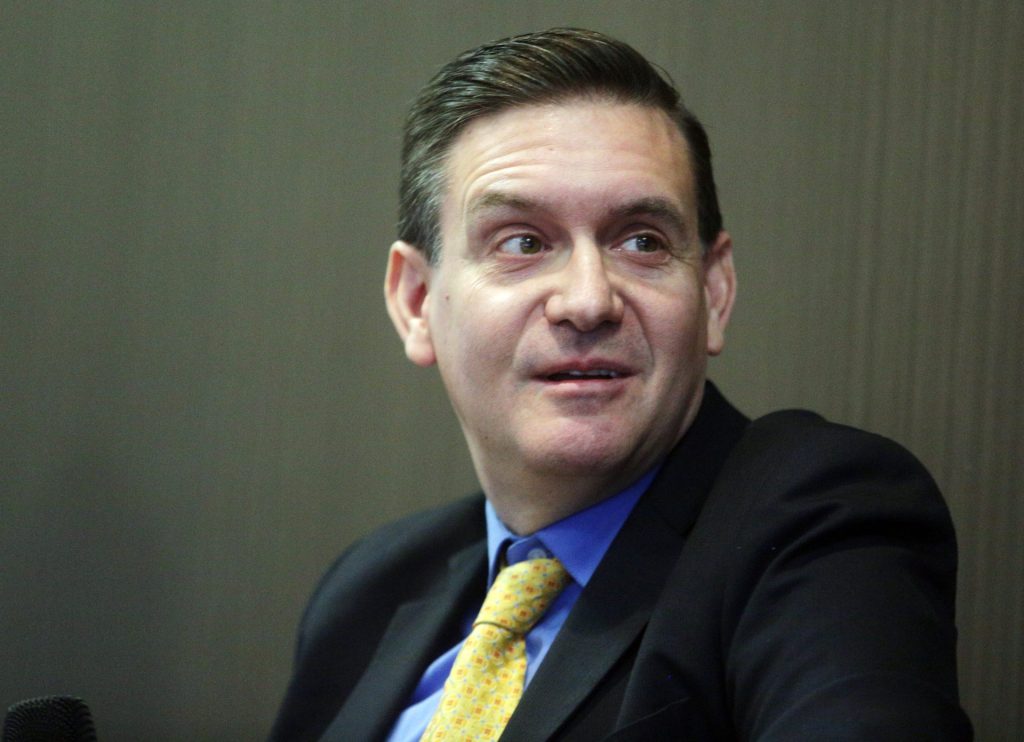
As Canadians went to the polls on election day, Trump once again argued that Canada should be absorbed by its southern neighbour, in a post on social media, seemingly calling on Canadians to elect himself.
Canada’s friction with its southern neighbour changed the ballot question in Canada from concerns over affordability amid a housing crisis and rising grocery prices to which leader can best handle the bellicose American president.
In the early days of the federal campaign, Carney argued that Canada’s traditional economic and security relationship was “over.” He pledged—if he remained in power—to negotiate a new economic and security partnership with the Trump administration.
Conservative Leader Pierre Poilievre faced internal party criticism for slowly pivoting to respond to the new ballot question as his electoral fortunes narrowed.
Less than a year ago, prior to Trudeau’s resignation as party leader and as prime minister, Canadians’ attitudes towards the sitting Liberal government were sour. After nine years in office, Trudeau struggled to retain support, both within his party and among the Canadian public. At one point, the Conservatives enjoyed a more than 20-point lead over the governing Liberals.
Prior to Trudeau’s resignation, the Conservatives were consistently polling at about 40 per cent, with the Liberals trailing at about half that, according to CBC’s poll tracker. The uptick in support for the Liberals came shortly after Trudeau’s resignation on Jan. 6. Liberals began to steadily rise in the polls, eventually closing the gap with the Conservatives, as the possibility of new party leadership entered the race.
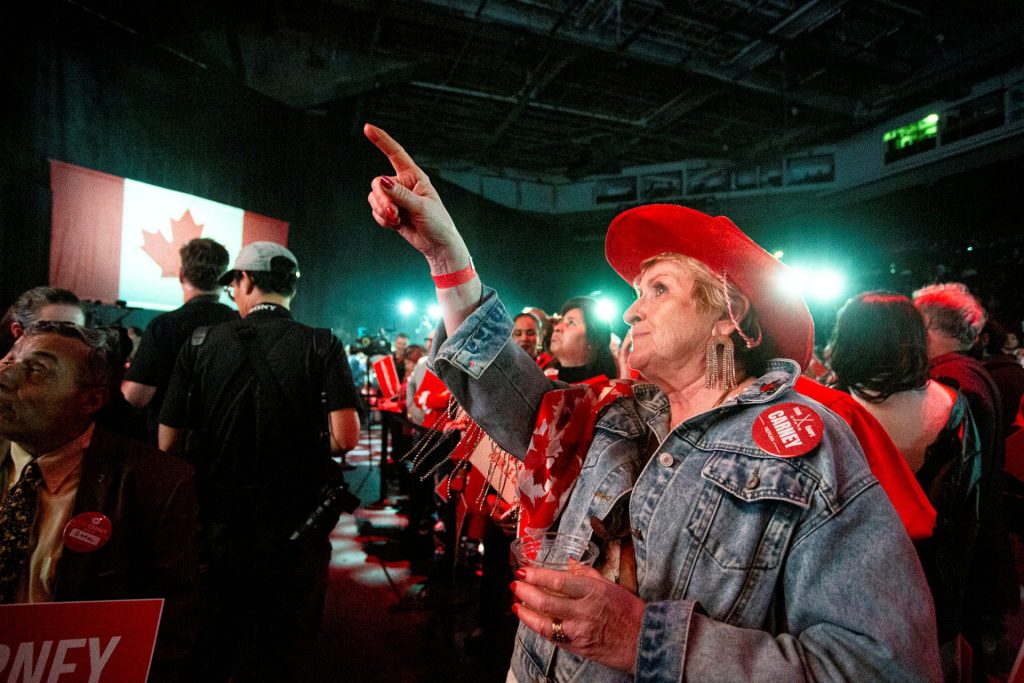
Bosch said the vote shows that Canadians are giving a message to the political class to stand up to Trump.
“I think Canadians are not saying, ‘Cut a deal with Trump’,” he said. “Canadians recognize that you handle a bully by being tough with a bully.”
Malek-Michel Jamali, one of Carney’s speechwriters, spoke to The Hill Times at the TD Place before the election had been called, as results were still rolling in. He said Canadians are feeling “anxiety” as a result of threats from the U.S., and that Carney’s message was unifying amidst that concern, which is why it resonated with Canadians.
“People have been reassured a lot by Prime Minister Carney’s language on this issue,” Jamali said. “So, it’s doubling down on that, and also the need for unity at a moment like this—that is crucial.”
Jamali also emphasized that Carney had clear plans for how to tackle the economy and the U.S. And that’s where the messaging has been focused.
“He ran this election with a message [that] has been consistent, and is just getting it to as many ears as possible,” Jamali said. “He has a plan for our economy, has a plan for our relationship with the United States.”
Inside Liberal campaign HQ
The Liberal campaign celebrated their victory at the TD Place at Lansdowne Park, an arena that has already played host to a few newly elected prime ministers.
Pierre Trudeau first became Canada’s prime minister in the arena in 1968, following his successful bid for the leadership of the Liberal Party. Canada’s first and only female prime minister was elected there, too—former Progressive Conservative leader Kim Campbell won the leadership election held in the arena in 1993, resulting in her briefly serving as prime minister.
Pierre Trudeau’s later resignation also paved the way for another Liberal prime minister’s election in the arena—John Turner ran for the party leadership in 1984, becoming Canada’s seventeenth prime minister in the then-named Ottawa Civic Centre in June of that year.
Inside the arena, screens showed the CBC and Radio-Canada broadcasts of election night. Poilievre had pledged to “defund” the English-language public broadcaster.
One of the loudest cheers of the night came at 11:25 p.m., as the CBC showed that Liberal candidate Bruce Fanjoy was 1,418 votes ahead of Poilievre in the early counting for Carleton, Ont.
In his victory speech, Carney said he was “looking forward to working with Bruce.”
“He will make a great MP,” Carney said.
Songs from Canadian bands were played for jubilant Liberal supporters, including Rush’s Tom Sawyer, Gordon Lightfoot’s Sundown, and Trooper’s We’re Here for a Good Time (Not a Long Time).
Guillaume Bertrand, a Liberal press secretary, said that it is a “good” moment for the Liberals who saw their party waning in support in the polls until the campaign, under Carney’s leadership kicked off.
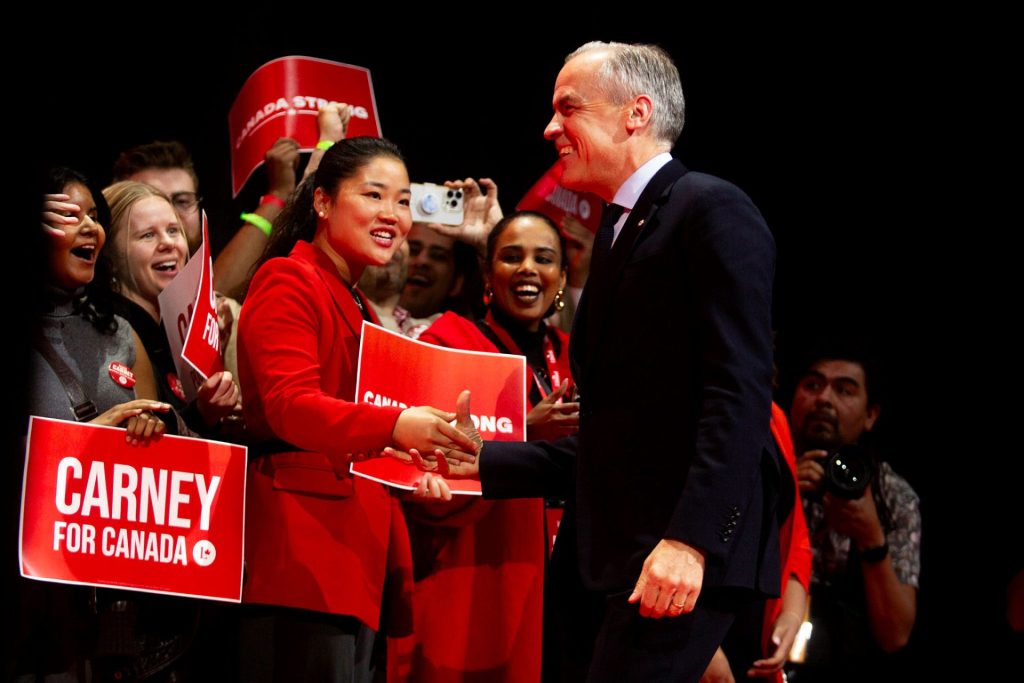
“Look back to two months ago, three months ago, where we were supposed to be… maybe second opposition or something, depending on who you were asking… now we’re projected to be re-elected,” Bertrand told The Hill Times as the initial results coming in showed his party leading.
“I don’t know if it’s going to be a minority or a majority government, but we’re really optimistic right now.”
“In all cases, I’m going on vacation with my boyfriend. I’m putting that on the record,” Bertrand said, adding that the Liberal team has been working “extremely hard to make this happen.”
‘Strong adult in the room’
Andrew Steele, who has worked on nine Liberal campaigns in the past, told The Hill Times that “it is the best showing I’ve seen in Quebec from a Liberal Party since Pierre Elliott Trudeau in 1980.”
“What we’re seeing is a lot of unity, a broad cross-Canada mandate and an ability to speak for the entire country, and that’s really important when we’re going to have to go tomorrow and start dealing with a very aggressive president U.S who wants to impugn our sovereignty,” said Steele, from inside the arena.
According to Liberal strategist Lloyd Rang, it was the “strong adult in the room energy” that brought success to Liberals at a time of what he called a lot of “chaos happening” between the U.S. and Canada.
“A Canadian leader stood up, who was eminently qualified for the job with an amazing CV that was suited to the moment. And I think the message was, in a sense, the person, because he brought with him all that experience and leadership dealing with crises,” Rang said. “Prime Minister Carney was the right person at the right time.”
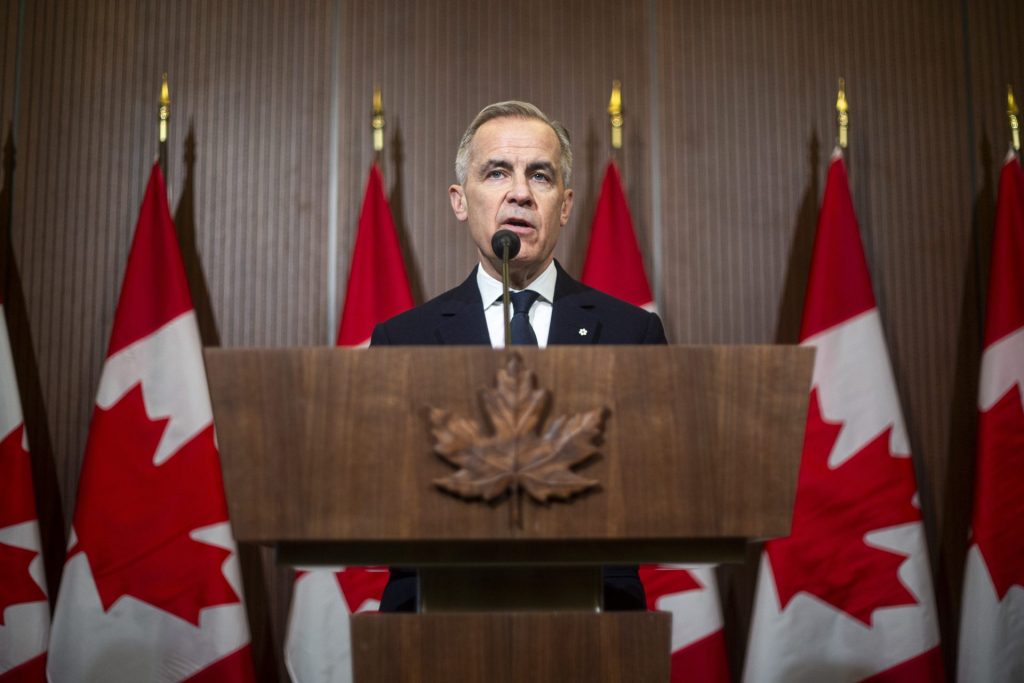
Dorothy Goubault, a Liberal party supporter, spoke with The Hill Times in the arena, where she was dancing amongst the crowd of supporters as results rolled in. She said former Justin Trudeau did a “terrific job” as prime minister, but she was excited for the future of the party under Carney’s leadership, calling the leader “a brilliant man.”
“There’s a time when things come to an end. Ten years is a long time in politics—he did a lot,” she said, speaking about Trudeau. “At the end of the day, we have [Carney] that’s taken over, and it’s just been onward and upward since then.”
Goubault said she was “very, very happy” about the prospect of Carney winning the election—which had not been officially announced at the time of the interview—citing his background as an economist.
“He’s an economist,” she told The Hill Times. “He’s a little bit above my mentality when it comes to numbers, and that’s why we’re looking at him.”
At 1 a.m., the Liberals had won 141 seats and were leading in 23 others; the Conservatives won 121 seats and were leading in 27; the Bloc Québécois won 20 seats and were leading in three; the NDP won four seats and were leading in three and the Greens won one seat, Green co-Leader Elizabeth May’s in Saanich-Gulf-Islands, B.C. NDP Leader Jagmeet Singh, meanwhile, resigned as party leader after losing his seat.
At 2:45 a.m., the Liberals had won 146 seats and were leading in 21; the Conservatives had won 127 seats and were leading in 18; the Bloc won 21 seats and were leading in two; and the New Democrats won four seats and were leading in three.
Editor’s note: This story was updated at 2:47 a.m.
news@hilltimes.com
The Hill Times





 LICENSING
LICENSING PODCAST
PODCAST ALERTS
ALERTS













